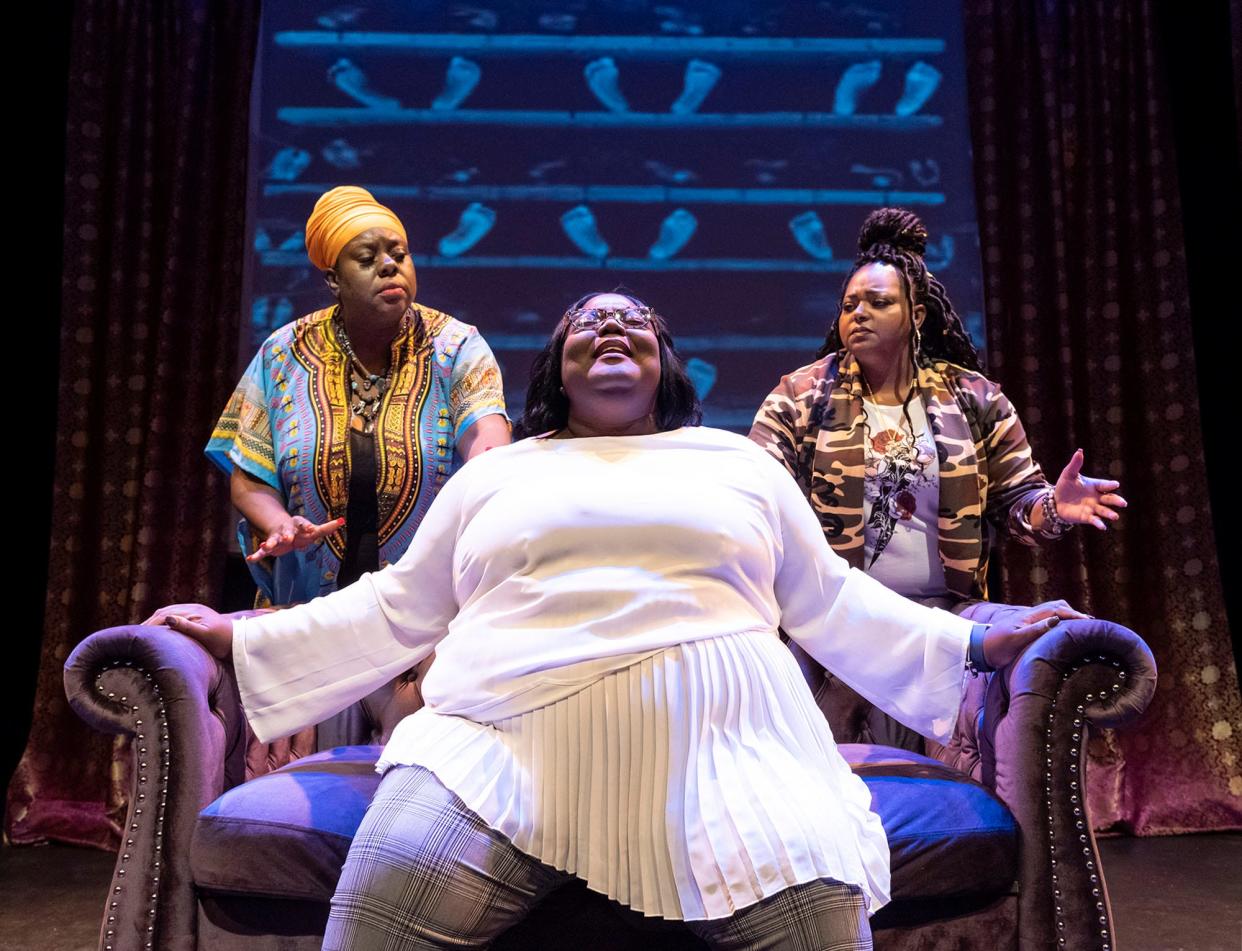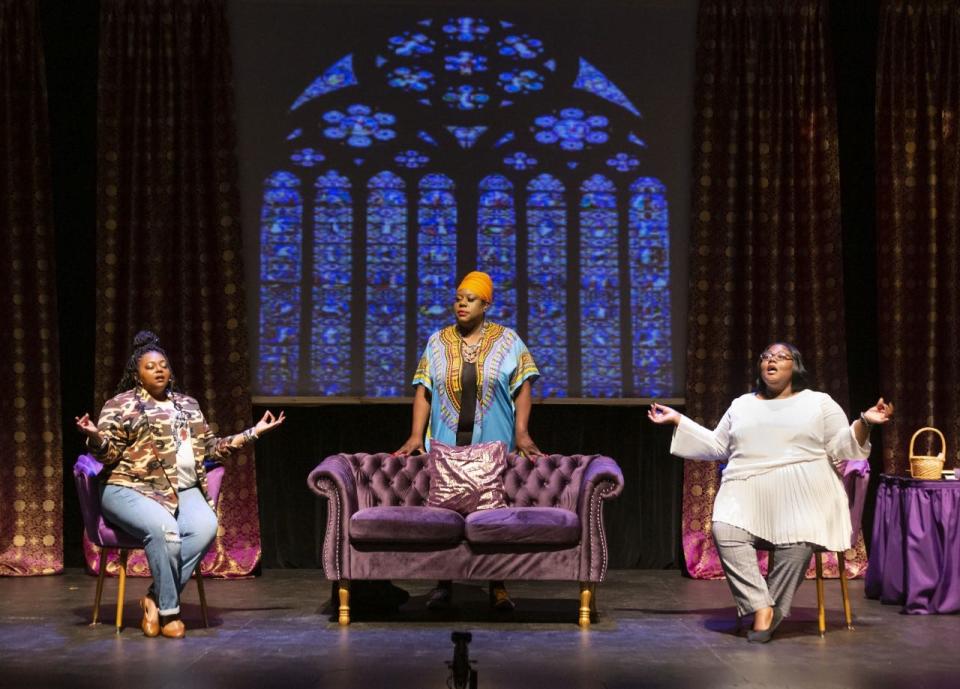Theatre Tuscaloosa's 'Mamalogues' lets Black women's lives take flight

A phrase caught fire when Barack Obama was elected as the United States' first Black president, printed on posters, T-shirts, banners, buttons and, of course social-media sites: “Rosa sat so Martin could march; Martin marched so Obama could run; Obama ran so our children could fly.”
Though it gained popularity after being quoted in the Pittsburgh Post Gazette, the phrasing derived from an email written by a 19-year-old single mother.
The three single mothers of Lisa B. Thompson's play "Mamalogues," opening Friday night in the Bean-Brown Theatre at Shelton State Community College, a production of Theatre Tuscaloosa, come to common ground from varying points.
Tasha (Clemmie Hilton) became a single mom as the result of her husband's death. Beverly (Catherine Doughty-Walker) went through a divorce. Lauren is a lesbian who became a mom via in-vitro fertilization.
During a mothers' retreat, they bond over shared experiences: Each became a mother at a time beyond which society considers child-bearing age. Each can recall mothers, grandmothers and aunts whose professional lives were limited, mostly to "domestic engineering," keeping house for wealthy white families.
Each knows the struggles of parenting kids through various phases, dealing with the dangers of the outside world, and facing off stereotypes. And each recognizes how far they have come can be traced back to how their predecessors struggled, now reaching rarified air where they and their kids can see the sky.
To say her character closely resembles real life is not far-fetched, Hilton said.
"The Tasha character is widowed, and a mother of three, with a son, and a set of twin daughters. And she's 51," she said. "I am also 51. I am a widow. I am a mother of three, with two daughters and one son."

Beyond the biographical, the wide-ranging discourses can often ring true, she said, from reflections on their forebears' lives to how wearying it can be as children grow through different phases, differing needs.
It's been important to the three Black actors, who haveve worked on local stages together in varying productions, are being led by a Black woman director, Kenyatta "YaYa" Browne.
"When I actually went in for the audition and I read for the role of Tasha, as I looked at Kenyatta, it was like, it felt as though there was a transference of energy, even in the audition," Hilton said.
A more diverse theater
Tina F. Turley, the company's executive producer, was also in the room; she's often expressed and carried out the idea that Theatre Tuscaloosa must strive to be more inclusive, developing productions of newer work, serving more diverse casts and audiences.
"It seemed as though Tina, through Kenyatta, gave us permission to be 100 percent African-American women," Hilton said, "no second-guessing, no doubting. And that is what caused the wheels to turn."
Browne, who moved to west Alabama from Miami, Florida, in 2015, became the first Black woman to direct for Theatre Tuscaloosa's main stage. She's been seen as a performer for the company in "Crowns," "Steel Magnolias" and the original play "Love and Cheese Toast," but this is her first directing job in Tuscaloosa.
"It's a commitment (Theatre Tuscaloosa has) made, as a nonprofit, to be more diverse, be more inclusive; to tell more stories, even if it makes people uncomfortable," Browne said.
"Mamalogues" runs a gamut of emotions, with each of the three actors at times stepping into other roles during reminiscences. At one time Hilton is playing a young white girl who shocks another by calling her the N-word.
"What theater does is it makes it tangible. You can see these things happening in real life. You are forced to listen and not respond," Browne said.
"For people of color, speaking just as a person of color, not a director, it completely validates your experience when you see yourself on stage. You feel like you've been heard; you don't feel like you're invisible.
"For people who are not of color, it gives you insight, and answers questions you may not be comfortable asking. It creates a dialogue."
'Everybody has a mama'
Browne reads new works looking for the kind of experiences that actors, designers and audiences might be challenged by, might find revealing, informative and entertaining. She found this new play by Lisa B. Thompson, and with others of the company, conducted a Zoom reading. Turley felt it had mainstage potential.
"Everybody has a mama," Browne said. "Everybody knows a mama. So it's two-fold. It gives you the experiences of a mother, the doubts, the triumphs, the laughs, the tears. And it has an extra layer being about women of color, their experiences compared to what people may think, or how it may seem on the outside."
Browne hoped to make the shows feel like an experience, so audiences could feel they were part of the retreat. As a result, sets are simple and spare. Lighting assists mood shifts. There are no costume changes — though the three actors do sometimes speak and act as others — and no intermission, during a show that runs about 96 minutes.
"It almost catapults you into a completely different space, so it doesn't feel like a play," Browne said. "I wanted a place of comfort and almost meditation, so you can forget you're watching, and feel you're part of it."
Aside from the resonances with reality, Browne led the actors to uncovering the truths of the characters. Those journeys were sometimes complex — one character suffers a stillbirth, and one of the actors had actually gone through that — and sometimes more direct. Hilton's character, a pediatrician, wears a headwrap that's meant to suggest knowledge, power, poise and grace.
"I've never worn one before," she said, so Browne helped HIlton with it in the dressing room. "When she wrapped, it felt symbolic, like an (ancestral) passage," harking back to the idea of mothers and grandmothers doing challenging labor so their daughters could enjoy greater chances for success.
"(Tasha) understands the importance of 'Now that I'm here, in this successful place, it's important for me to reach back,' " Hilton said.
Preparing for the show turned into a kind of therapy, Browne said.
"I think everyone is like this: You put on this facade of 'I've got it all together. I'll take care of everything. Everything will be OK,' " she said.
While exploring characters, the women wove in how their lives related to the script, but then used the characters to speak.
"What it turned into was a bunch of women who could kind of release in a way that we would feel uncomfortable releasing sometimes, in a room with other people who don't share that story," Browne said.
One thing the process brought home, she said, laughing, was that "All Black women are not all alike! 'I would never say that!'
"It made us look at ourselves, look at some of the prejudices we have against other people, and against each other," she said. "We were able to just let the wall down. We had tears in places."
Hilton found the process empowering.
"We have the opportunity to do what I call 'let the cat out of the bag,' where Black women, things that may be on our hearts or our minds that we may not express publicly, it is expressed through our particular characters in this play," she said.
PARTY DOWNTOWN: What to know before you go to the Druid City Arts Festival
Billed as a satirical comedy, "Mamalogues" can be funny, can be sad, can be shocking, and often finds a variety of points in between.
"I want everybody to know, you're just going to have to put your seatbelt on," Hilton said. "One moment you might be laughing, one moment you might be crying, one moment you might be silent. One moment you could be clutching your pearls.
"There is not a consistent emotion in this show. It's very much enjoyable, but I can tell you the audiences are going to be on an emotional rollercoaster."
"The Mamalogues" is being produced by Theatre Tuscaloosa in the Bean-Brown Theatre at Shelton State Community College, 9500 Old Greensboro Road. Performances are at 7:30 p.m. Friday, Saturday, May 26 and 27, with 2 p.m. matinees Sunday, Wednesday, and May 28 and 29. Tickets are $19 general; $17 for seniors, members of the military, and Shelton State employees; and $14 for students and children. Special rates are available for groups of 10 or more. For more, see www.theatretusc.com or call 205-391-2277.
This article originally appeared on The Tuscaloosa News: Theatre Tuscaloosa's 'Mamalogues' lets Black women's lives take flight

